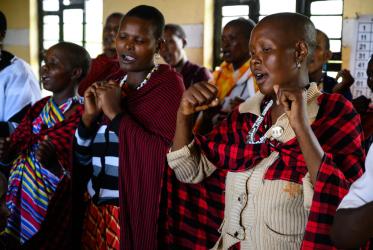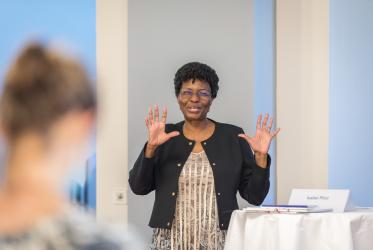by Isabel Apawo Phiri, deputy general secretary of the WCC
1. Introduction
In this session, we, Isabel Apawo Phiri and Philip Vinod Peacock have been given the responsibility of reflecting on the theme of justice drawing from the experiences of Africa and Asia while bearing in mind that injustice permeates every dimension of human relationships and our relationship with the earth be it from the global North or the global South. Furthermore, we are working with the assumption that while humanity has the ability to control, oppress and exploit others and the earth, those with power also have the capacity to use it to do good by enabling, empowering and emancipating the oppressed, especially when inspired by their belief in God of justice who is the creator of humanity and the universe. God has given power to all. Those with more power have a greater responsibility to stand, speak and act with and on behalf of those with less power like the marginalized and discriminated against. In this case, the world is calling upon the faith leaders to use their power for justice for the excluded and discriminated against and for the exploited planet earth.
We are also working with the understanding that in the World Communion of Reformed Churches we call each other to account for the implementation of issues that bind us together. As a communion we excise our ministry of solidarity by listening to one another and accompany one another towards fulfilling our mandate from our Lord Jesus that all those who are created in the image of God are assisted to live their lives according to the declaration of Jesus that he came that all may have fullness of life in abundance (John 10:10).
In our presentation, we engage the concept of gender justice through the lens of postcolonial theory. We affirm the comment of Musa Dube, a postcolonial New Testament scholar that:
‘The struggle for liberation of postcolonial feminist readers is located within the framework of resisting global and natural structures of oppression – be they politically, economically, socially, or culturally based. Since gender oppression pervades all sectors of life, postcolonial feminist readers add gender analysis to the struggle of Two-Thirds World communities of resistance to ensure that national and international efforts of establishing justice do not side-line gender justice. Postcolonial feminists thus ask how various forms of national oppression affect women and men, how international forms of oppression affect men and women, how gender oppression functions with other forms of oppression such as class, race, ethnicity, age, and sexual orientation. They also propose various ways of reading that will chart social justice and that take on gender justice in national and international relationships.2
Given the above framework, we see a link between postcolonial theory and the justice discourse within the World Communion of Reformed Churches.



